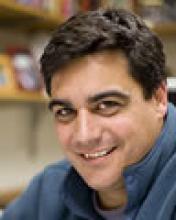Ignacio Provencio, Ph.D, neuroscientist from the Univerisity of Virginia will give a lecture on how melanopsin has been developed to be used as an optogenetic tool.
Melanopsin is the photopigment that renders intrinsically photosensitive retinal ganglion cells light sensitive. Much has been learned about the role of ipRGCs within the last decade. ipRGCs mediate an array on non-visual responses to light including the photoentrainment of circadian rhythms, the pupillary light reflex, and the acute control of sleep. Melanopsin shares greater homology with the photopigments of invertebrates rather than those of vertebrates. This homology suggested to investigators that the phototransduction cascade initiated by the photoactivation of melanopsin may use the signaling pathway of invertebrate photoreceptors. It was subsequently shown to be the case. This signaling pathway has been exploited to control biological processes by light. The use of melanopsin as a light sensor has implications for the pharmaceutical industry and clinicians. These possibilities will be discussed and explored in this seminar.
Iggy grew up in Lebanon, PA and attended Swarthmore College. He developed an interest in neuroscience in college, but he was unclear what he wanted to do. He worked for two years as a research technician in Steve Reppert’s lab at Mass. General Hosp./Harvard Medical School where he became interested in circadian rhythms. He attended the University of Virginia for graduate school under the mentorship of Russell Foster. After receiving his Ph.D. in 1996, he did a postdoc at Uniformed Services University under the tutelage of Mark Rollag. It was here that they identified melanopsin and initiated their work in this area. In 2000 he became an assistant professor at Uniformed Services University. He returned to his old department at the University of Virginia at the end of 2004 where he continues his research on nonvisual photoreception and where he teaches undergrads.



